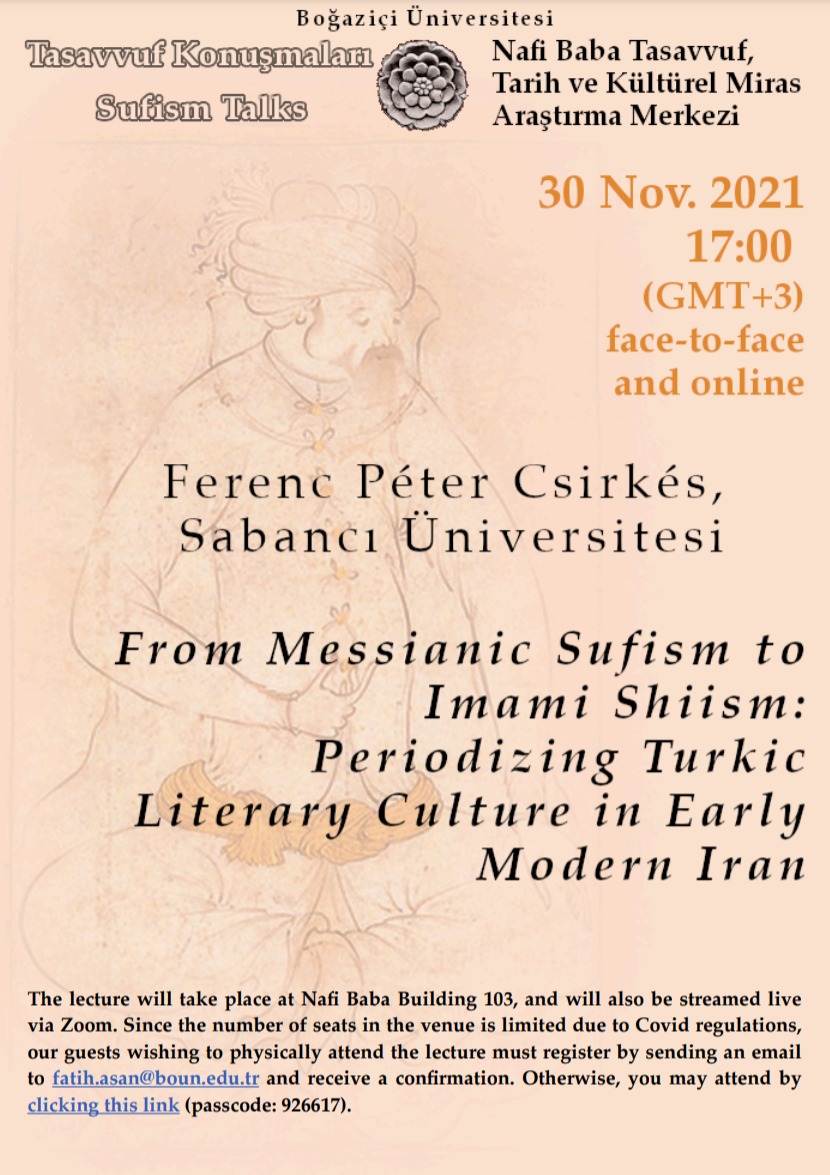From Messianic Sufism to Imami Shiism: Periodizing Turkic Literary Culture in Early Modern Iran

The Nafi Baba Center for Research in Sufism, History and Cultural Heritage cordially invites you to a hybrid lecture by Ferenc Péter Csirkés titled "From Messianic Sufism to Imami Shiism: Periodizing Turkic Literary Culture in Early Modern Iran" on November 30, 2021, at 17:00.
The lecture will take place at the Nafi Baba Building Room 103, and will also be streamed via zoom and youtube. Due to Covid regulations, the number of seats at the venue is limited. Students and faculty wishing to physically attend the lecture must send an email to fatih.asan@boun.edu.tr and receive a confirmation. You may attend via zoom by clicking here (passcode: 926617).
The paper is a broad overview of the problems of periodizing Turkic literature and literacy in Safavid Iran (1501-1722). It discusses how it can be connected to the religious and political history of the region, and how to contextualize it against the background of such global processes as early modern confessionalization, vernacularization, and state-building. As is well-known, the Safavids came to power as one of the radical antinomian messianic movements in the wake of the decline of Mongol rule in the larger Persianate world, finding their military and social base in Turkic nomadic groups (the Qizilbash) in Anatolia and Iran, founding a dynasty along the lines of Islamic-Iranian notions of kingship, and garnering the support of Twelver Shiite theologians they invited from Lebanon, Iraq, and Bahrein. Aside from patronizing Persian literature, the Safavid elite and the Qizilbash aristocracy also promoted the literary subculture of their Turkic following and the greatly prestigious Chaghatay literary heritage they inherited from the Timurids. The paper argues that this first period of Turkic literature in Iran came to an end when the Qizilbash lost most of its prominence with the social, political, bureaucratic, and military centralization policies of Shah 'Abbas I (r. 1588-1629), which also changed the relation of Turkic vis-à-vis Safavid political theology. However, just as these profound shifts did not eliminate Sufism from Iran, they did not mean an end to Turkic as a literary language, either, which continued as a literary subculture up to our very present and became the vehicle for a new cultural-political profile under the Afshars after the collapse of the Safavids.
Dr. Csirkés received his PhD in Near Eastern Languages and Civilizations at the University of Chicago and is currently an assistant professor of History at Sabancı University. Prior to that, he worked at CEU in Budapest and the University of Tübingen. Straddling literary, intellectual, and cultural history, as well as historical sociolinguistics on the one hand, and Persian and Turkish on the other, his research focuses on the interrelation of the politics of language, confessionalization, and state-building in the larger Turko-Persian world during the late medieval and early modern periods.

